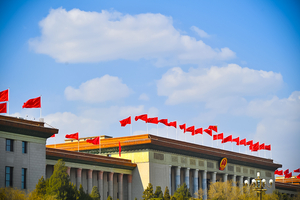China’s Legislature Overturns Judicial Ruling That Spooked Investors
Listen to the full version

China’s top legislative body has overturned a judicial interpretation related to the country’s recently revised Company Law, which had raised concerns that investors who had sold their stakes would be liable for paying previously promised cash.
Yuan Hui, a lawyer from Beijing Liang Gao Law Firm, said the clarification protects shareholders, preventing former investors who transferred equity before the law’s enactment from being held automatically liable for a company’s outstanding debts.

Unlock exclusive discounts with a Caixin group subscription — ideal for teams and organizations.
Subscribe to both Caixin Global and The Wall Street Journal — for the price of one.
- DIGEST HUB
- China's top legislative body overturned a judicial interpretation related to the Company Law, preventing ex-investors from being automatically liable for a company's past debts.
- The revision aims to maintain legal consistency and addresses the registered capital system, enforcing a five-year deadline for capital contributions from shareholders.
- An Article 88 misinterpretation suggesting retroactive liability was corrected by the National People’s Congress, ensuring non-retroactive application, although liability may still exist based on various factors.
China's top legislative body has recently annulled a judicial interpretation related to the newly revised Company Law, which had raised concerns among the investment community. The interpretation suggested that investors who had divested from a company could still be held liable for previously promised financial contributions, causing concern over potential financial burdens for former stakeholders[para. 1].
Beijing-based lawyer Yuan Hui explains that this legislative clarification protects shareholders by ensuring that investors who transferred their equity before the law's enactment cannot be automatically held liable for a company's outstanding debts[para. 2]. This decision underlines the role of China's filing and review system, which ensures judicial decisions align with the Constitution and higher laws[para. 3]. Jiang Bingxi, an assistant professor at Nanjing University Law School, terms the legislative action as having "benchmark significance," emphasizing the importance of legal consistency and clarity in the application of laws[para. 4].
The core of the issue lies in the rules governing corporate registered capital, the initial investment required from shareholders when a company is established in China. Since the Company Law's inception in 1993, shareholders were mandated to contribute the full amount immediately. However, in 2015, the rules were relaxed to require an initial contribution of only 20%, with a deadline of up to five years for the full contribution[para. 5][para. 6]. In 2013, another revision eliminated the minimum contribution requirement altogether, allowing companies to set their own timelines. This change was intended to lower entry barriers and promote entrepreneurship but inadvertently led to cases where companies inflated their registered capital to unsustainable levels, triggering financial chaos when they later defaulted on commitments[para. 7].
To rectify this, the Company Law underwent a significant revision in 2023, reinstating a five-year deadline for registered capital contributions[para. 8]. Additionally, Article 88 was added, stipulating that if a shareholder defaults, any prior shareholder could still be called upon to cover these dues, even if they have already divested their equity stake[para. 9]. A judicial interpretation by the Supreme People’s Court (SPC) in the summer posited that this liability could be applied retroactively to transfers before the law's effective date of July 1, 2024[para. 10].
However, this retroactive interpretation met with public backlash, pushing the National People’s Congress Standing Committee (NPCSC) to reconsider its legality. It concluded in December that the interpretation breached the principle of non-retroactivity, leading to the SPC's clarification that Article 88 should not be applied to past equity transfers[para. 11][para. 16]. Despite the clarification, Yuan Hui notes that liability could still fall on previous shareholders if equity was transferred to parties unable to cover the capital requirements[para. 13][para. 14].
The filing and review system, vital to this legislative correction, operates as China's mechanism to ensure legal acts abide by the Constitution and superior laws. Strengthening its enforcement, the NPCSC's decision mandates a thorough review of legislative measures to correct any identified errors[para. 18].
- 1993:
- The Company Law was first enacted, requiring shareholders to pay the full registered capital upon the establishment of a company.
- 2013:
- Revision to the Company Law removed the minimum requirement for initial capital contributions and allowed companies to set their own deadlines.
- 2015:
- Introduction of a limited contribution system allowing initial payment of at least 20% of registered capital with a deadline between two to five years.
- 2023:
- Major overhaul of the Company Law introduced a five-year deadline for shareholders to pay registered capital, with stipulations for shareholders to pay immediately if the company cannot pay its creditors. Article 88 was added.
- Late 2023:
- NPCSC decided to strengthen the filing and review system's implementation, requiring regulations and judicial interpretations to be reviewed and corrected if necessary.
- Last summer:
- The Supreme People's Court issued a judicial interpretation applying Article 88 retroactively to equity transfers before July 1, 2024.
- By December 2024:
- The NPCSC concluded that the interpretation violated the principle of non-retroactivity. The SPC clarified that Article 88 does not apply to pre-July 1, 2024, equity transfers.
- PODCAST
- MOST POPULAR






